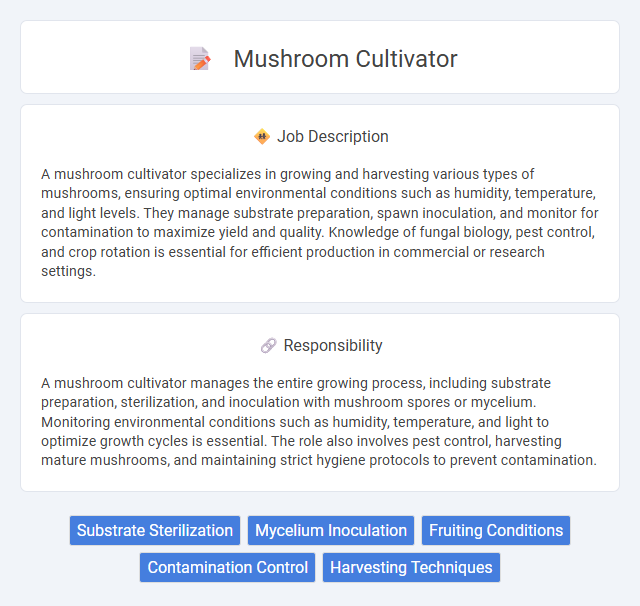
A mushroom cultivator specializes in growing and harvesting various types of mushrooms, ensuring optimal environmental conditions such as humidity, temperature, and light levels. They manage substrate preparation, spawn inoculation, and monitor for contamination to maximize yield and quality. Knowledge of fungal biology, pest control, and crop rotation is essential for efficient production in commercial or research settings.
Mushroom cultivator jobs may suit individuals who enjoy working in controlled environments and have a strong attention to detail for managing growth conditions. People prone to allergies or sensitivities to mold and spores might find this role challenging. Those with patience and the ability to follow precise procedures probably perform better in maintaining healthy, productive mushroom crops.
Qualification
A Mushroom cultivator must possess knowledge of fungal biology, cultivation techniques, and environmental control to optimize growth conditions. Practical experience in sterilization, substrate preparation, and pest management is essential for maintaining crop health and yield. Strong attention to detail and the ability to monitor humidity, temperature, and light levels are critical qualifications for effective mushroom farming.
Responsibility
A mushroom cultivator manages the entire growing process, including substrate preparation, sterilization, and inoculation with mushroom spores or mycelium. Monitoring environmental conditions such as humidity, temperature, and light to optimize growth cycles is essential. The role also involves pest control, harvesting mature mushrooms, and maintaining strict hygiene protocols to prevent contamination.
Benefit
A Mushroom Cultivator job likely offers benefits such as hands-on experience with sustainable agriculture and access to cutting-edge cultivation techniques. There is a strong probability of gaining knowledge about organic farming practices and improving crop yield efficiency. This role may also provide opportunities for career growth in the expanding field of specialty mushroom production.
Challenge
The mushroom cultivator job likely involves managing delicate growing conditions, requiring careful monitoring of humidity, temperature, and contamination risks. Problems with pests, diseases, or fluctuating environmental factors may frequently challenge consistent yield quality. Successfully addressing these issues probably demands both technical knowledge and adaptive problem-solving skills.
Career Advancement
Mushroom cultivators develop expertise in mycology, enhancing their skills in spawn production, substrate preparation, and environmental control to optimize yield. Career advancement opportunities include roles such as farm manager, quality control specialist, or research technician in agricultural biotechnology firms. Continuous learning and certification in sustainable farming practices improve prospects for leadership positions within commercial mushroom farming enterprises.
Key Terms
Substrate Sterilization
Mushroom cultivators specialize in substrate sterilization to eliminate contaminants and create an ideal environment for fungal growth. They employ techniques such as steam sterilization, autoclaving, or chemical treatments to ensure the substrate is free of competing microorganisms. Proper substrate sterilization directly impacts yield quality and reduces risks of crop failure in commercial mushroom production.
Mycelium Inoculation
Mycelium inoculation is a critical process in mushroom cultivation, involving the introduction of spawn into a sterile growing medium to initiate fungal growth. Experts in this role ensure precise sterilization protocols and environmental controls to promote healthy mycelium colonization, which directly impacts mushroom yield and quality. Proficiency in aseptic techniques and knowledge of spawn types are essential for optimizing inoculation success and preventing contamination.
Fruiting Conditions
Mushroom cultivators meticulously control fruiting conditions such as temperature, humidity, and light exposure to optimize mushroom growth and yield. Maintaining a consistent temperature range of 55-75degF and relative humidity levels around 85-95% promotes healthy fruit body development. Precise regulation of CO2 levels and proper airflow ensures optimal respiration and prevents contamination during the fruiting phase.
Contamination Control
Mushroom cultivators prioritize contamination control to ensure healthy mycelium growth and high yield quality. Strict hygiene protocols and sterilization techniques are employed to prevent bacterial, fungal, and mold intrusions during spawn preparation and substrate inoculation. Maintaining controlled environmental conditions such as temperature, humidity, and airflow further mitigates the risk of contamination in mushroom cultivation facilities.
Harvesting Techniques
Mushroom cultivators employ precise harvesting techniques to ensure product quality and maximize yield, carefully identifying the optimal maturity stage for each mushroom species. They use specialized tools and gentle hand-picking methods to avoid damage and contamination during collection. Post-harvest, cultivators implement immediate cooling and controlled humidity environments to maintain freshness and extend shelf life.
 kuljobs.com
kuljobs.com